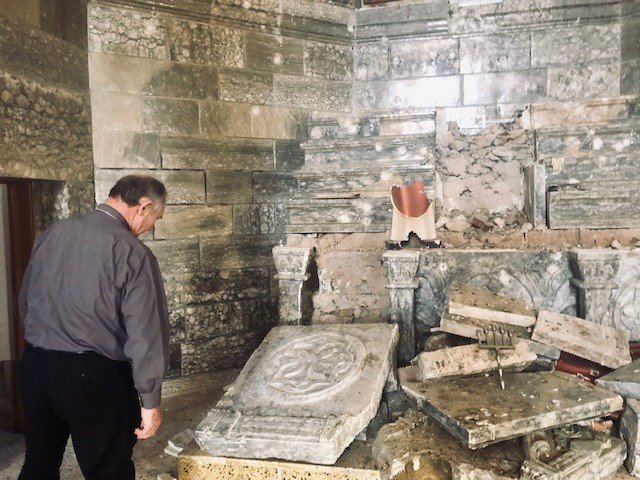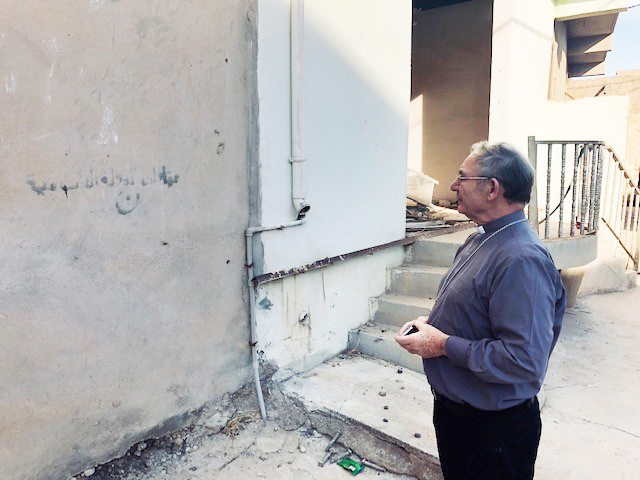Bishop Paul McAleenan, lead bishop for asylum and migration, was recently invited by Aid to the Church in Need to visit Iraq, to witness the work of reconstruction after the devastation by so-called ISIS, which displaced hundreds of thousands, including 90,000 Christians in northern Iraq. He reflects on his visit.
The whole trip was a mixture of inspiration, shock and surprise. To be actually in the place which we hear so much about and to witness the extent of the destruction, not only of entire villages but of cemeteries and churches riddled with bullet holes, was a sobering experience.
Those who are now returning to their villages are facing many challenges. First they must identify their homes and, when they have identified them, examine how badly damaged they are. The reconstruction scheme, spearheaded by Aid to the Church in Need, concentrates on restoring the least damaged houses first, then moves on to burnt houses, and then finally to work on the totally demolished houses.
Many of the clergy have started schemes to address the psychological trauma that some people have experienced. They are making use of the behavioural sciences and the different psychologies that we are familiar with in the West. There seems to be enormous resilience and, even though the memory of the destruction is still in their minds, people seem to be coping with it very well with the support of the different agencies including in the Church.
To stand in Batnaya was an unforgettable experience. It is one town that is totally, utterly and absolutely devastated and flattened. To be in such a town and to see not only the houses demolished but also the Christian cemeteries devastated and shattered, with sledgehammers presumably, was an unforgettable experience. We went to the local church where the altar had been damaged, and niches, which had housed statues, were riddled with bullet holes, indicating that before the statues were removed, they were actually attacked with rifles.

Even though many of the churches were beautifully restored, often one area of the church has been deliberately left as it had been as a reminder. Sometimes that took the form of a broken statue, and other times it took the form of leaving a bullet hole, or some burn damage, as a reminder to the people of what had happened to them and to their community.
In one particular church they had actually made a museum of some of the damaged artefacts, which were now housed behind the glass screen so that people, presumably in the future, could come and witness what had taken place.
I see this as an ownership by the residents of their history, of what had happened to them as a Christian people, which they don’t want to forget. So often in history we can forget what has happened. Maintaining some of these places in their damaged state, the residents were ensuring that this will always be in the forefront of their minds.
We went to a number of public Masses. Even in late afternoon, the number of people attending Mass was so impressive. The faith is very strong and it does not seem that the events of the last few years have dimmed that faith in any way. In fact, one could say, though I haven’t been there before, it might indeed have strengthened their faith.
Personally, the visit brought home to me the reality of the pain that so many people experience in their lives. When we listen to the news or read of war-torn areas and different conflicts, we don’t actually have a full understanding of what is taking place. But to be there and to know this actually happened to real people, that it’s happened in my lifetime to a person to whom I’m speaking is very sobering.
I found it inspirational that the Church is leading the drive to rebuild physical buildings and people’s lives. In the absence of any civic structure it is the Church that is in the vanguard of building hospitals, universities, and homes, and the Church there that is present as a teacher and a mother. What can give us great encouragement is how the Church is making a real difference in the lives of people, and it is seen and acknowledged for it.




